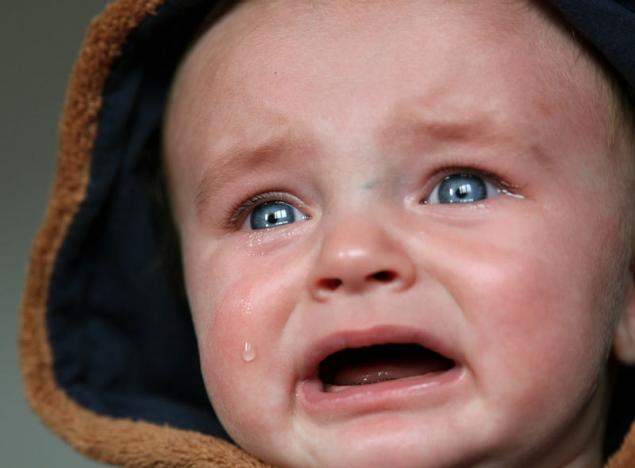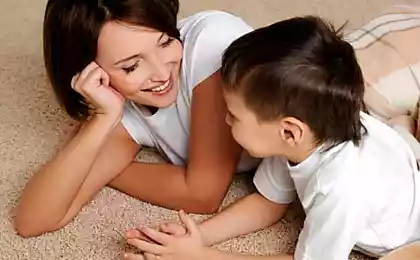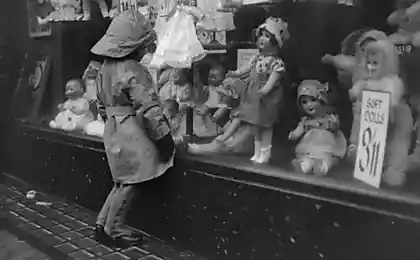404
Why not baby "leave crying"
First of all I must say that the studies that are availability of now has not been in the availability of many years ago. Neuroscientists now know that the experiences children is much more important than we could ever imagine. At birth only 15% of its neural connections are formed.
This is the simplest connection that allows you to survive, but the other 85% mainly in the first 3 years, and they are based on the child's experience. At the very simplest level, neurophysiology has proved that the role of parents is absolutely critical in determining the future of the child. Child growing up in a loving, caring and understanding, has a setting in the brain for positive results.
When mom or dad hugs the child, sing to him, carry him in your arms, they help build baby's brain in those relationships that will later help him learn to build relationships based on love. If you show your child warmth and love, giving him the opportunity to experience positive emotions, and it will grow into a happy, healthy, caring adult.
It argued that if every time the baby cries, take him up, it can spoil. Neuroscientists now know based on the facts that the child at this age you cannot spoil them. His brain is not yet capable of manipulation.

The information below is intended to gather factual knowledge from different areas to help moms make an informed choice and not just go on about the Soviets "as necessary". It does not take away the right of every mom and dad on the "maternal instinct". There are many different methods of upbringing and care, among them there are methods, which engenders in the child a sense of security and trust, and by and large this is common sense. However, the information about why it's better for a child who is not always there, and so the information given below.
When doctors and psychologists say about these or other disorders in children, they often mention a wide range of disorders associated with "loss of attachment to the mother", and unfortunately, not all of them apply only to children from orphanages. In particular, in the context of these disorders and gives advice to approach a crying baby and not leave him crying, or to apply the methods of "controlled crying".
More specifically about the problems of child sleep, and it is associated with most cases when a child is left to cry in loneliness, should first think about the cultural stereotypes of how to sleep a baby. If scientists start from the sleep model, which is convenient for parents in our culture, the study does not reflect the child's needs, and built to a false theory. Therefore, we believe that the child should or should not sleep do not reflect how he actually sleeps. And before applying any techniques it is worth considering how reasonable our demands to the sleeping child.
Many parents, especially the older generation often say that if you take the baby every time he cries, he is "spoiled", and are taught to cry, took him in his arms. This promise is based on behaviorist research in the early 20th century, which was refuted by dozens of later studies and rejected by the majority in its application to child and man in principle. Therefore, fear "spoil"- is false, a child's brain is not able to be done until such manipulations. Studies referenced by promoting this false theory, was concerned with laboratory rats, and their reactions to "positive reinforcement".
Man differs from other mammals.Only 15% of the human brain has neural connections at birth (compared to chimpanzees, the closest according to the similarity of the primacy, which at the time of birth there are 45% of neural connections). This speaks to the immaturity of the nervous system, and that in the next 3 years the child's brain will be busy building those relationships and that his experience in the first 3 years, his relationship with his parents, and in particular the relationship with her mother, and form the "structure" of his personality.
Children learn about the world through the way people around them (parents, siblings) react to them. This also applies to sleep. According to studies, one a clinical psychologist, the children learn to calm down when they are calm. Not when they are left to cry until exhaustion. Many people think that only children from orphanages become reclusive, angry, insensitive, and sometimes it's because they lack communication. This is not so. The same clinical psychologist took 6 month old baby from the family home and placed him in foster care because the child could not cry at all! He was fed, clothed, warmed, but his cries went unanswered! And child "closed", as this happens to abandoned children in orphanages. In 9 months I had to re-teach the child to stretch out his hands to be picked up!
Parents often say that controlled crying methods work. They work because the baby stop crying! And what works? The child has learned to calm down, or lost the hope that he will help? It is not good?
Dr. Jay Gordon believes that the younger a crying baby cease to react, the more chances that the child will be "closed", even a little. She also believes that children who hug, or feed all night, sooner or later will learn to calm down and to sleep independently. Everything else, in her opinion, it's just a LIE that helps to sell books on the methods of controlled crying.

In the 1970s Dr. T. berry Brazelton studied newborns, particularly if they can experience despair or depression. In the video, which breaks my heart see small children who cry to get a reaction from mom, and if they don't work, then they cry even louder. After some time, having tried all of the expression and attempts to catch his mother's eye, the child reaches a peak of patience and starts to turn away, no longer able to make fruitless efforts. In the end, the child turns away and refuses to look at her mother. Then he turns, and tries to elicit a response. And every time he turns on all more long-term and the long term. In the end, every child drops the head, calms down, and shows all signs of despair.
As written by Linda Palmer in the book "the Chemistry of Attachment", neural and hormonal communication that the child and the parent, helping them to develop mutual affection, are among the strongest in nature. As soon as the child was born, hormonal control systems and brain synapses begin to gain a permanent structure in accordance with the treatment that the child is experiencing. Unneeded brain receptors and neural connections disappear and new ones suitable to the world that surrounds the child, intensify (part of brain development occurring during the first 3 years).
Constant physical contact, and other caring parents produce a constant high level of oxytocin in the child, which in turn suppresses the reaction to stress hormones. Many psychological studies have shown that, depending on the behavior of parents, high or low level of oxytocin in the brain of a child led to the formation of permanent structure of the stress response.
Children are forming positive emotions and high levels of oxytocin begin to show the characteristics of a "confident and loved" the child, the child kept crying, ignored, deprived of communication, angrily react to their displays of emotion, crying, growing, exhibit the characteristics of "insecure, unloved" child and then a teenager and later an adult. The characteristics of the "uncertainty" include antisocial behavior, aggression, inability to long-term love relationships, mental illness and inability to cope with stress.
Newborns are significantly more sensitive to pheromones than adults. They are not able to Express themselves with speech, and therefore rely on more primitive feelings, which control each other more than lower animals. The early, primitive experiences of the child allow him to develop a higher ability to understand facial expressions and emotions, than we can expect. So the child learns to know the level of stress in those who care for him, in other words, whether the mother is experiencing fear or joy. Part of the stress from the lack of close mother can be that the child loses the ability to understand whether it is safe. The second way of understanding is the tactile and natural body odors, which is felt by the child, because the pheromones can be felt only if my mom is around.
The argument "well, they left the child crying at 3 months of age and he's alright" is incorrect. If you look at the sociological situation in the society, crime increases, the level of drug use increases, the divorce rate is increasing and so on. Of course, this has no direct relationship only with the child's dream, but it all starts at home. According to Dr. Servan-Schreiber, he sees the direct effects of parental care only about their interests, and use by those or other "educational" methods, in adults who come to him for treatment of depression, anxiety, and inability to build open trusting relationships.
He said, sensitive children, crying which did not respond, begin to consider their need for the warmth and calm — the lack of character of parents — cold, distant figures, and the fear and loneliness — inevitable of human existence.They learn that emotionally-important people can't be trusted, that they cannot expect understanding and support.
Because the innate need to control her not, they try to cope with it, or refusing and hiding from their emotions (depressive tendencies in adults), or to satisfy their loneliness or pain is not with people but with things more reliable, for example, alcohol or drugs.
The theory that taking the child on hands, we are his spoil, narcoticyou and was extremely popular in the early 20th century. It was assumed that if the "to promote" lament the fact that taking the child in his arms, the child will cry more. As it turned out, human behavior is still more complicated. Dr. RA bell and Ainsworth investigated two groups of parents with children. In the first group of children many have embraced, carried on hands. It was a happy, confident children, the result of caring parents. The second group was raised more strictly on their crying did not always respond, they lived on a more rigid schedule was not always provided warmth and care. All children were followed for about a year. Children in group A showed much greater independence.
Moreover, the syndrome of "closure" can be applied not only to the orphanage children. Only the child can know the depth of my need. Children who are left to cry alone, or did not carry arms, being afraid to spoil, in the end can grow in the most insecure adults. Children who are "trained" not to show their needs, may appear to be docile, friendly, "nice" children. But they just refuse to Express their needs, or can grow into adults who are afraid to Express something that they want.
All studies of early childhood show that children are constantly receiving love and care in early childhood are the most loving and confident adults, and children who were forced into subordinate behavior (left to cry) and leads to feelings of anger and hatred, which subsequently may be expressed in various harmful ways.
Frequently asked question — what's the alternative? Given the available research, the physiological and psychological needs of the child, we must accept the necessity of certain principles for themselves.
You can try the method hiss=pats, but if it doesn't work, you can take a chair and sit next to the child, putting his hand on him, so he felt a constant calming (especially at the age when the child learns object permanence, 6-8 months). If a child is overexcited, unable to sleep, and no methods work — just be near him, that he felt. If you find it hard, do it in turns with dad. The main principle — do not leave the child because psychologically children learn reaction. If you are lucky and you have a child who is ready to fall asleep, and you don't need him in the room... great, but all the other kids just want their needs met, and they communicate with us as best they can. Even if your baby is crying and you are near, he knows you are with him. I can hear him.
And to calm yourself, have conducted a large study regarding the number of wakings in the night, and their dependence on age. After reducing the number of wakings at the age of 3 to 6 months, after 9 months again recorded growth in the number of wakings. Increase anxiety night's sleep by the end of 1 year of life is associated with enormous socio-emotional leapfrog development that characterizes this stage of development. At the age of 1 year, 55% of children woke up at night.
Supplement want to post one, mother, the original post in English, my translation:
"I'm not an expert on sleep, but if you're at the point of despair, and eager to finally sleep, you sometimes come to mind, well, can't be wrong all those people who suggest "leave to prioratise", and nothing really scary there.
My son just turned 10 months. Since birth he hasn't slept more than 2 hours, and yesterday for the first time he slept through the night. I was so happy just fretting because I didn't sleep more than 2 hours straight all these 10 months. And today he slept until 4:30 in the morning!
I called everyone whom I knew, and all told me the same thing: "... if he starts to cry shortly after falling asleep, just leave him and he'll understand..."
On this day, he went to bed as usual, around 8 PM, and 9:30 already cried for the first time. It was not a desperate crying, just cry that meant "I woke up". I went to him, and my head buzzed all the tips that you don't need to come in, and I tormented myself with the fact that I'm lame and can't do.
I went to his room and saw his son sitting in the bed holding his blanket, and only COVERED with vomit. The whole bed was in the vomit, and even the walls and floor. He was sitting in a huge puddle of vomit. When he saw me, he cried for real.
I took him up, and he immediately fell asleep, probably due to exhaustion and dehydration from vomiting. And I felt sick thinking of what would happen if I left him to cry? He would fall asleep sooner or later, most likely right there in his own vomit, alone, scared and sick. It would be sick again (and then he was sick all night), and maybe he'd choked on his own vomit only because I wanted to sleep all night?!
What about all those children who get left to cry alone. How many of them scared, hurt, how many people were sick and needed my mom, but I knew that crying will not help them, because I was not helped in the past? How many of them the temperature only noticed in the morning when the child was "stand up"?
Believe me, I was so desperate that the thought "keep to prioritise" visited me. But the child is small not forever. And sleepless nights — not forever. And every time think you're desperate and over all the strength and patience, and you're somewhere even hate this creature, which does not allow you to sleep the third hour in a row at 4 in the morning... remember that you've been given a great gift to care, to love, and protect. After all, it is possible to lose in one moment, scared and irrational.published
P. S. And remember, just changing your mind — together we change the world! ©
Source: woman-rules.ru/family/pochemu-nelzya-ostavlyat-proplakatsya-/
This is the simplest connection that allows you to survive, but the other 85% mainly in the first 3 years, and they are based on the child's experience. At the very simplest level, neurophysiology has proved that the role of parents is absolutely critical in determining the future of the child. Child growing up in a loving, caring and understanding, has a setting in the brain for positive results.
When mom or dad hugs the child, sing to him, carry him in your arms, they help build baby's brain in those relationships that will later help him learn to build relationships based on love. If you show your child warmth and love, giving him the opportunity to experience positive emotions, and it will grow into a happy, healthy, caring adult.
It argued that if every time the baby cries, take him up, it can spoil. Neuroscientists now know based on the facts that the child at this age you cannot spoil them. His brain is not yet capable of manipulation.

The information below is intended to gather factual knowledge from different areas to help moms make an informed choice and not just go on about the Soviets "as necessary". It does not take away the right of every mom and dad on the "maternal instinct". There are many different methods of upbringing and care, among them there are methods, which engenders in the child a sense of security and trust, and by and large this is common sense. However, the information about why it's better for a child who is not always there, and so the information given below.
When doctors and psychologists say about these or other disorders in children, they often mention a wide range of disorders associated with "loss of attachment to the mother", and unfortunately, not all of them apply only to children from orphanages. In particular, in the context of these disorders and gives advice to approach a crying baby and not leave him crying, or to apply the methods of "controlled crying".
More specifically about the problems of child sleep, and it is associated with most cases when a child is left to cry in loneliness, should first think about the cultural stereotypes of how to sleep a baby. If scientists start from the sleep model, which is convenient for parents in our culture, the study does not reflect the child's needs, and built to a false theory. Therefore, we believe that the child should or should not sleep do not reflect how he actually sleeps. And before applying any techniques it is worth considering how reasonable our demands to the sleeping child.
Many parents, especially the older generation often say that if you take the baby every time he cries, he is "spoiled", and are taught to cry, took him in his arms. This promise is based on behaviorist research in the early 20th century, which was refuted by dozens of later studies and rejected by the majority in its application to child and man in principle. Therefore, fear "spoil"- is false, a child's brain is not able to be done until such manipulations. Studies referenced by promoting this false theory, was concerned with laboratory rats, and their reactions to "positive reinforcement".
Man differs from other mammals.Only 15% of the human brain has neural connections at birth (compared to chimpanzees, the closest according to the similarity of the primacy, which at the time of birth there are 45% of neural connections). This speaks to the immaturity of the nervous system, and that in the next 3 years the child's brain will be busy building those relationships and that his experience in the first 3 years, his relationship with his parents, and in particular the relationship with her mother, and form the "structure" of his personality.
Children learn about the world through the way people around them (parents, siblings) react to them. This also applies to sleep. According to studies, one a clinical psychologist, the children learn to calm down when they are calm. Not when they are left to cry until exhaustion. Many people think that only children from orphanages become reclusive, angry, insensitive, and sometimes it's because they lack communication. This is not so. The same clinical psychologist took 6 month old baby from the family home and placed him in foster care because the child could not cry at all! He was fed, clothed, warmed, but his cries went unanswered! And child "closed", as this happens to abandoned children in orphanages. In 9 months I had to re-teach the child to stretch out his hands to be picked up!
Parents often say that controlled crying methods work. They work because the baby stop crying! And what works? The child has learned to calm down, or lost the hope that he will help? It is not good?
Dr. Jay Gordon believes that the younger a crying baby cease to react, the more chances that the child will be "closed", even a little. She also believes that children who hug, or feed all night, sooner or later will learn to calm down and to sleep independently. Everything else, in her opinion, it's just a LIE that helps to sell books on the methods of controlled crying.

In the 1970s Dr. T. berry Brazelton studied newborns, particularly if they can experience despair or depression. In the video, which breaks my heart see small children who cry to get a reaction from mom, and if they don't work, then they cry even louder. After some time, having tried all of the expression and attempts to catch his mother's eye, the child reaches a peak of patience and starts to turn away, no longer able to make fruitless efforts. In the end, the child turns away and refuses to look at her mother. Then he turns, and tries to elicit a response. And every time he turns on all more long-term and the long term. In the end, every child drops the head, calms down, and shows all signs of despair.
As written by Linda Palmer in the book "the Chemistry of Attachment", neural and hormonal communication that the child and the parent, helping them to develop mutual affection, are among the strongest in nature. As soon as the child was born, hormonal control systems and brain synapses begin to gain a permanent structure in accordance with the treatment that the child is experiencing. Unneeded brain receptors and neural connections disappear and new ones suitable to the world that surrounds the child, intensify (part of brain development occurring during the first 3 years).
Constant physical contact, and other caring parents produce a constant high level of oxytocin in the child, which in turn suppresses the reaction to stress hormones. Many psychological studies have shown that, depending on the behavior of parents, high or low level of oxytocin in the brain of a child led to the formation of permanent structure of the stress response.
Children are forming positive emotions and high levels of oxytocin begin to show the characteristics of a "confident and loved" the child, the child kept crying, ignored, deprived of communication, angrily react to their displays of emotion, crying, growing, exhibit the characteristics of "insecure, unloved" child and then a teenager and later an adult. The characteristics of the "uncertainty" include antisocial behavior, aggression, inability to long-term love relationships, mental illness and inability to cope with stress.
Newborns are significantly more sensitive to pheromones than adults. They are not able to Express themselves with speech, and therefore rely on more primitive feelings, which control each other more than lower animals. The early, primitive experiences of the child allow him to develop a higher ability to understand facial expressions and emotions, than we can expect. So the child learns to know the level of stress in those who care for him, in other words, whether the mother is experiencing fear or joy. Part of the stress from the lack of close mother can be that the child loses the ability to understand whether it is safe. The second way of understanding is the tactile and natural body odors, which is felt by the child, because the pheromones can be felt only if my mom is around.
The argument "well, they left the child crying at 3 months of age and he's alright" is incorrect. If you look at the sociological situation in the society, crime increases, the level of drug use increases, the divorce rate is increasing and so on. Of course, this has no direct relationship only with the child's dream, but it all starts at home. According to Dr. Servan-Schreiber, he sees the direct effects of parental care only about their interests, and use by those or other "educational" methods, in adults who come to him for treatment of depression, anxiety, and inability to build open trusting relationships.
He said, sensitive children, crying which did not respond, begin to consider their need for the warmth and calm — the lack of character of parents — cold, distant figures, and the fear and loneliness — inevitable of human existence.They learn that emotionally-important people can't be trusted, that they cannot expect understanding and support.
Because the innate need to control her not, they try to cope with it, or refusing and hiding from their emotions (depressive tendencies in adults), or to satisfy their loneliness or pain is not with people but with things more reliable, for example, alcohol or drugs.
The theory that taking the child on hands, we are his spoil, narcoticyou and was extremely popular in the early 20th century. It was assumed that if the "to promote" lament the fact that taking the child in his arms, the child will cry more. As it turned out, human behavior is still more complicated. Dr. RA bell and Ainsworth investigated two groups of parents with children. In the first group of children many have embraced, carried on hands. It was a happy, confident children, the result of caring parents. The second group was raised more strictly on their crying did not always respond, they lived on a more rigid schedule was not always provided warmth and care. All children were followed for about a year. Children in group A showed much greater independence.
Moreover, the syndrome of "closure" can be applied not only to the orphanage children. Only the child can know the depth of my need. Children who are left to cry alone, or did not carry arms, being afraid to spoil, in the end can grow in the most insecure adults. Children who are "trained" not to show their needs, may appear to be docile, friendly, "nice" children. But they just refuse to Express their needs, or can grow into adults who are afraid to Express something that they want.
All studies of early childhood show that children are constantly receiving love and care in early childhood are the most loving and confident adults, and children who were forced into subordinate behavior (left to cry) and leads to feelings of anger and hatred, which subsequently may be expressed in various harmful ways.
Frequently asked question — what's the alternative? Given the available research, the physiological and psychological needs of the child, we must accept the necessity of certain principles for themselves.
You can try the method hiss=pats, but if it doesn't work, you can take a chair and sit next to the child, putting his hand on him, so he felt a constant calming (especially at the age when the child learns object permanence, 6-8 months). If a child is overexcited, unable to sleep, and no methods work — just be near him, that he felt. If you find it hard, do it in turns with dad. The main principle — do not leave the child because psychologically children learn reaction. If you are lucky and you have a child who is ready to fall asleep, and you don't need him in the room... great, but all the other kids just want their needs met, and they communicate with us as best they can. Even if your baby is crying and you are near, he knows you are with him. I can hear him.
And to calm yourself, have conducted a large study regarding the number of wakings in the night, and their dependence on age. After reducing the number of wakings at the age of 3 to 6 months, after 9 months again recorded growth in the number of wakings. Increase anxiety night's sleep by the end of 1 year of life is associated with enormous socio-emotional leapfrog development that characterizes this stage of development. At the age of 1 year, 55% of children woke up at night.
Supplement want to post one, mother, the original post in English, my translation:
"I'm not an expert on sleep, but if you're at the point of despair, and eager to finally sleep, you sometimes come to mind, well, can't be wrong all those people who suggest "leave to prioratise", and nothing really scary there.
My son just turned 10 months. Since birth he hasn't slept more than 2 hours, and yesterday for the first time he slept through the night. I was so happy just fretting because I didn't sleep more than 2 hours straight all these 10 months. And today he slept until 4:30 in the morning!
I called everyone whom I knew, and all told me the same thing: "... if he starts to cry shortly after falling asleep, just leave him and he'll understand..."
On this day, he went to bed as usual, around 8 PM, and 9:30 already cried for the first time. It was not a desperate crying, just cry that meant "I woke up". I went to him, and my head buzzed all the tips that you don't need to come in, and I tormented myself with the fact that I'm lame and can't do.
I went to his room and saw his son sitting in the bed holding his blanket, and only COVERED with vomit. The whole bed was in the vomit, and even the walls and floor. He was sitting in a huge puddle of vomit. When he saw me, he cried for real.
I took him up, and he immediately fell asleep, probably due to exhaustion and dehydration from vomiting. And I felt sick thinking of what would happen if I left him to cry? He would fall asleep sooner or later, most likely right there in his own vomit, alone, scared and sick. It would be sick again (and then he was sick all night), and maybe he'd choked on his own vomit only because I wanted to sleep all night?!
What about all those children who get left to cry alone. How many of them scared, hurt, how many people were sick and needed my mom, but I knew that crying will not help them, because I was not helped in the past? How many of them the temperature only noticed in the morning when the child was "stand up"?
Believe me, I was so desperate that the thought "keep to prioritise" visited me. But the child is small not forever. And sleepless nights — not forever. And every time think you're desperate and over all the strength and patience, and you're somewhere even hate this creature, which does not allow you to sleep the third hour in a row at 4 in the morning... remember that you've been given a great gift to care, to love, and protect. After all, it is possible to lose in one moment, scared and irrational.published
P. S. And remember, just changing your mind — together we change the world! ©
Source: woman-rules.ru/family/pochemu-nelzya-ostavlyat-proplakatsya-/























